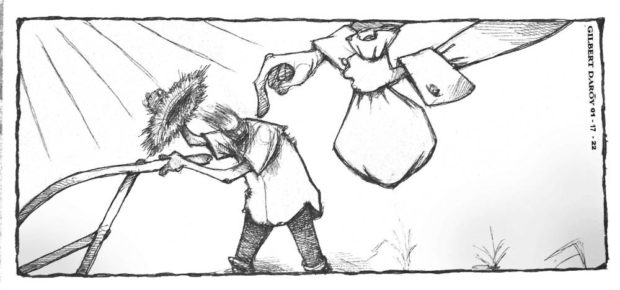
Some relief is coming the way of small rice farmers in the form of direct financial aid until 2024 under Republic Act No. 11598, or the Cash Assistance for Filipino Farmers Act, which was signed into law by President Duterte on Dec. 10, 2021, and made public earlier this month. Small rice farmers tilling two hectares and below are among the poorest and most neglected sectors of the economy.
They bore the brunt of the impact of the rice import liberalization since 2019, and the more recent onslaught of Supertyphoon Odette, whose damage to the agriculture sector already topped P13.4 billion as of last week. There are an estimated 1.67 million of these farmers listed in the official Registry System of Basic Sectors.
In signing the law, the government acknowledged the reality that it had to address the plight of small farmers. “The State recognizes the urgency of intervening for our farmers in light of the current state of declining palay prices and the crippling effects of the COVID-19 pandemic. Towards this end, the State shall provide monetary assistance to the hardest hit segments of the country’s small farmers in the form of actual giving of cash to farmers,” RA 11598 read.
The law mandates the Department of Agriculture (DA) to get funds from the taxes collected on rice imports. A Rice Competitiveness Enhancement Fund (RCEF) was created through RA 11203, or the Rice Tariffication Law, which removed government limits—called quantitative restrictions—on rice importation. The RCEF will get P10 billion a year from the tariff collected from rice imports to help implement programs that will improve productivity and boost the competitiveness of Filipino rice farmers through skills training, access to farm inputs and machinery, and low-interest loans.
The rice import taxes in excess of P10 billion will be the direct cash assistance to the small farmers until 2024 under the new law, which tasks the Bureau of Customs (BOC) to directly remit to the DA such excess funds. The good news is that the excess in tariff collection from rice imports will hopefully approximate the high level in 2020. The BOC has collected P14.3 billion worth of rice import duties as of the first week of October last year. It said tariff collections came from 2.18 million metric tons of rice imported by the country from Jan. 1 to Oct. 8, 2021. This means small farmers are assured of dividing among themselves P4.3 billion in excess rice tariff. The excess collection in 2019 amounted to only P12.3 billion, which jumped to P15.47 billion in 2020 due to the big volume of rice imports.
At the end of each year, the new law requires the BOC and the DA to submit separate reports to Congress on the remittance of funds and the actual cash disbursement for the year. This raises another red flag. Who will check if the money indeed went to the affected farmers? Suspicions of wrongdoing have often accompanied programs and projects involving a government agency or local government unit in the distribution of direct cash aid to the poor. The “ayuda” program at the height of the pandemic in 2020 is a case in point, with tens of thousands of poor families complaining that they did not get any such subsidy. There has to be a transparent way of monitoring the flow of money from the BOC to the DA and, more importantly, to the farmer-beneficiaries.
In the longer term, it is obvious that more than the financial aid, the government must focus on reinvigorating the agriculture sector instead of relying on imports of agricultural products to augment the country’s food supply. Government policy to address increases in farm produce prices has often been to import more.
For the recent damage caused by Odette, the government can better assist the farmer-victims providing the necessary support so that they can be able to plant crops again, as suggested by Samahang Industriya ng Agrikultura executive director Jayson Cainglet. He told the Inquirer last week that since rice crops damaged by the storm were yet to be harvested, the immediate need of farmers were seeds and fertilizers so they could replant immediately. “Aside from cash assistance, farmers would rather resume planting and harvesting rice,” he added.
No doubt the new law, as pointed out by Sen. Cynthia A. Villar, chair of the Senate agriculture and food committee, would be a huge assistance to Filipino farmers given the impact of the COVID-19 pandemic and the recent typhoon on their lives. “Any amount we give to our farmers will be a big help to augment their income and improve their poor living conditions,” she added. More than these stop-gap aid programs, the government — and the private sector — really need to address how productivity of small farmers can be boosted, and how their products will be bought at the fairest price possible. A price that will sustain them, not the middleman’s exploitative low price that only pushes small farmers deeper into poverty.

